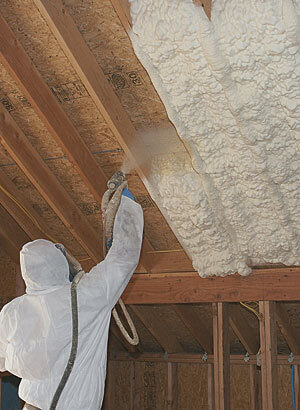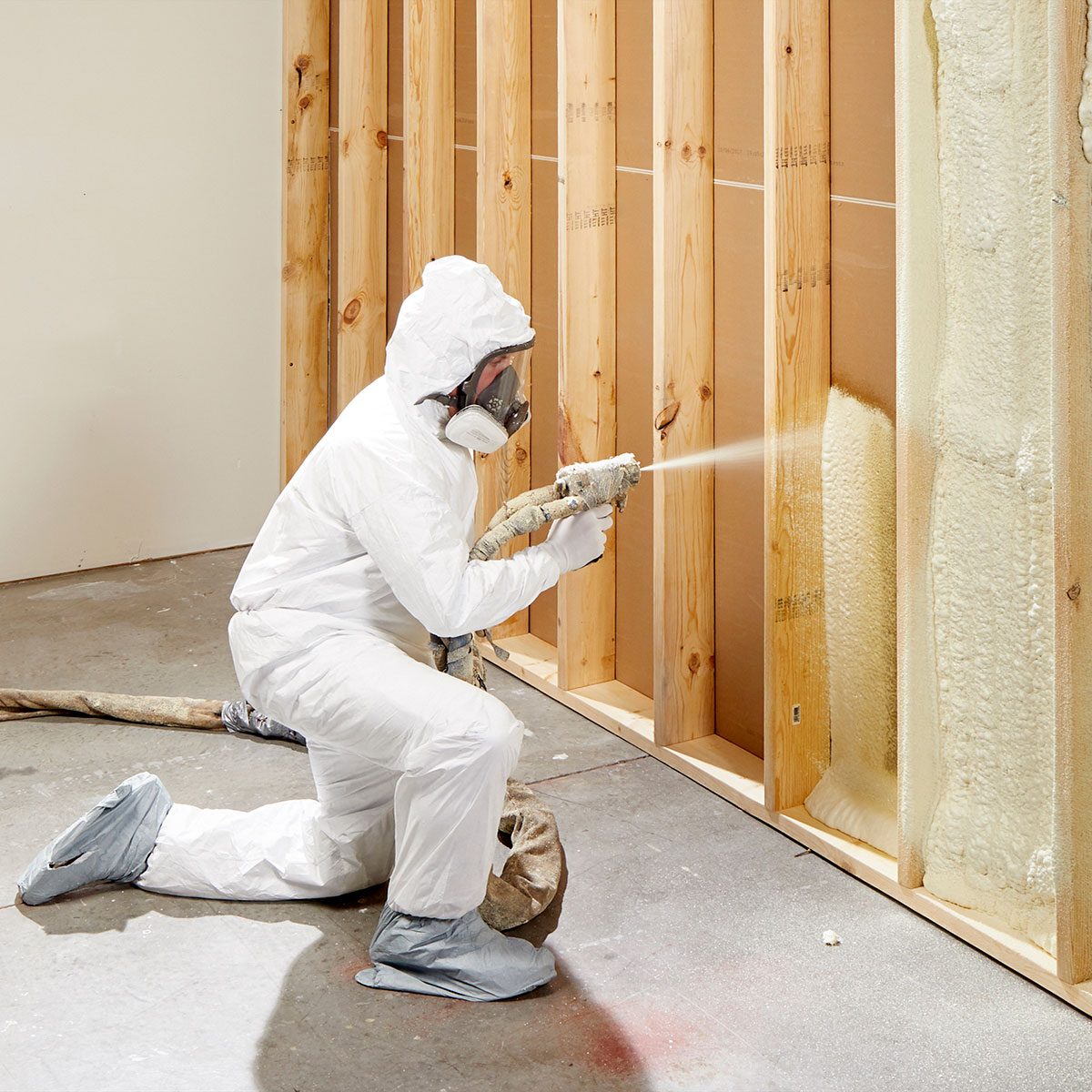Top Applications of Spray Foam for Residential and Commercial Properties
Top Applications of Spray Foam for Residential and Commercial Properties
Blog Article
Spray Foam: The Ultimate Service for Air Sealing and Insulation
Spray foam insulation has actually arised as a leading solution for reliable air securing and thermal insulation, offering a special mix of residential or commercial properties that set it apart from conventional techniques. Understanding the full scope of its advantages, installation processes, and comparisons with other insulation types is vital for making informed choices.
What Is Spray Foam?
Spray foam is a functional insulation product that integrates the principles of air securing and thermal resistance to improve energy efficiency in buildings. Made up mainly of polyurethane or other comparable substances, spray foam is applied as a liquid that increases upon call with surfaces, creating a solid, continual layer of insulation. This one-of-a-kind residential property enables it to fill up voids, fractures, and gaps that typical insulation materials might ignore, providing a superior air seal.
There are two major kinds of spray foam: open-cell and closed-cell. Open-cell spray foam is lighter and more adaptable, providing excellent audio absorption and a reduced R-value per inch - Spray Foam. On the other hand, closed-cell spray foam is denser, supplying a higher R-value, moisture resistance, and included structural honesty to building parts
The application procedure commonly entails specialized tools, making certain a smooth application that abides by numerous substratums, including steel, timber, and concrete. This versatility makes spray foam ideal for both brand-new constructions and retrofitting existing frameworks. Its capacity to produce a closed barrier significantly adds to minimizing energy consumption and boosting indoor air high quality, thereby making it a favored selection among building contractors and homeowners alike.
Benefits of Spray Foam Insulation
Among one of the most substantial benefits of spray foam insulation is its exceptional capacity to create a constant air obstacle, which efficiently lessens energy loss. Unlike conventional insulation materials, spray foam broadens to fill up fractures and voids, guaranteeing that air leak is substantially decreased. This particular not just boosts energy performance but likewise results in reduce energy bills with time.
Furthermore, spray foam insulation supplies superior thermal resistance, contributing to an extra steady indoor setting. Its high R-value per inch allows for effective insulation in confined rooms, making it optimal for attic rooms, walls, and crawl rooms. Moreover, the moisture-resistant buildings of spray foam help avoid mold and mold growth, promoting healthier living problems.
One more critical benefit of spray foam insulation is its sound-dampening high qualities (Spray Foam). It efficiently lowers noise transmission between rooms, producing a quieter and a lot more comfortable home environment. The toughness of spray foam likewise attracts attention, as it does not droop or clear up gradually, maintaining its performance throughout its life expectancy
Exactly How Spray Foam Works
Comprehending how spray foam insulation works is vital for valuing its effectiveness in air securing and thermal resistance. Spray foam insulation consists of two primary parts: isocyanate and polyol material. When these parts are blended, they undergo a chain reaction that triggers the product to expand quickly, creating a thick foam that fills up dental caries, splits, and gaps.
As the foam expands, it sticks to surface areas, developing a closed seal that considerably minimizes air infiltration. This particular makes spray foam insulation highly effective at stopping drafts and dampness penetration, which can bring about power loss and damages with time. Furthermore, the closed-cell variation of spray foam offers premium thermal resistance because of its rigid structure, properly lessening warmth transfer.
The distinct properties of spray foam permit it to conform to uneven surface areas, guaranteeing thorough coverage and a smooth obstacle. Because of this, spray foam insulation not only enhances energy efficiency yet likewise adds to improved interior air top quality by reducing the buildup of contaminants and allergens. Eventually, recognizing the mechanics behind spray foam emphasizes its role as a remarkable selection for insulation and air securing in both household and industrial applications.
Installation Refine Review

Prior to setup, the room must be effectively cleansed and prepped, guaranteeing that surface areas are without wetness, particles, and dirt. Because contaminants can jeopardize bond and general efficiency, this step is important. As soon as the location is prepared, the application entails blending the two elements of the spray foam, which broadens upon call and loads voids effectively.
Trained professionals should conduct the installation, utilizing specific devices to make certain consistent insurance coverage and optimal thickness. Safety and security precautions, including wearing protective gear and guaranteeing appropriate ventilation, are critical throughout this procedure. After application, the foam normally remedies rapidly, developing a strong barrier that improves energy effectiveness.
Comparing Spray Foam to Conventional Insulation
When assessing insulation choices, spray foam insulation sticks out in comparison to traditional products such as fiberglass and cellulose. Among the primary benefits of spray foam is its remarkable air sealing abilities. Unlike fiberglass and cellulose, which can enable air infiltration, spray foam increases upon application, filling up gaps and holes to develop an impermeable seal. This results in boosted energy effectiveness, as less warmed or cooled air escapes the home, bring about reduced utility costs.
Additionally, spray foam gives a greater R-value per inch than traditional insulation kinds, offering even more effective thermal resistance in a thinner profile. This particular is especially advantageous in rooms with restricted cavity depth. In go to these guys addition, spray foam is resistant to wetness and mold and mildew growth, which can be a substantial issue with cellulose and fiberglass, specifically in humid settings.
Nonetheless, spray foam insulation generally brings a higher upfront cost than its traditional equivalents. House owners need to weigh this initial financial investment versus long-lasting energy financial savings and performance benefits. Eventually, while both insulation kinds offer their objective, spray foam becomes a more sophisticated option for modern-day insulation demands, particularly in terms of air sealing and thermal effectiveness.

Final Thought
In summary, spray foam insulation represents a highly effective solution for achieving optimal air sealing and thermal resistance. Its unique homes, including wetness resistance and sound dampening, make it suitable for various applications in both brand-new building and constructions and retrofitting jobs (Spray Foam). Although the first prices might be higher compared to standard insulation materials, the long-lasting benefits, such as significant power savings and improved indoor air high quality, validate the financial investment and highlight its value in modern structure methods.
Spray foam insulation has arised as a leading service for effective air securing and thermal insulation, offering a special mix of buildings that set it apart from typical methods.Spray foam is a functional insulation product that combines the concepts of air securing and thermal resistance to enhance power effectiveness in structures.When examining insulation options, spray foam insulation stands out in contrast to standard products such as fiberglass and cellulose. Eventually, you could try here while both insulation types offer their objective, spray foam arises as a much more sophisticated service for modern insulation needs, particularly in terms of air sealing and thermal Homepage performance.
In recap, spray foam insulation stands for an extremely efficient remedy for achieving optimum air securing and thermal resistance.
Report this page